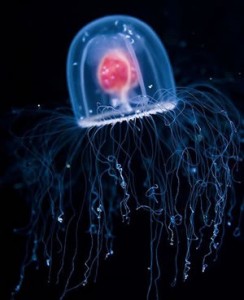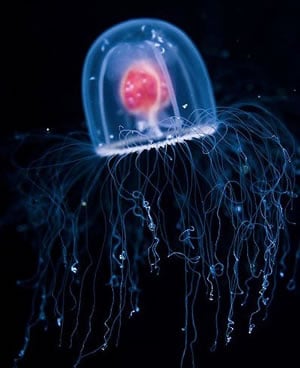 Turritopsis nutricula can do something amazing. It can turn back the clock.
Turritopsis nutricula can do something amazing. It can turn back the clock.
This tiny creature, which beings life as a polyp and then metamorphoses into a jellyfish, can change itself back into a polyp after it has reached maturity. This reversal of aging is caused by cellular transdifferentiation – the transformation of a cell from one type to another.
Turritopsis nutricula has been nicknamed “the immortal jellyfish” because it does not have to age continuously and therefore, as long as it can survive disease, starvation or predation, it appears that it will never die.
As expected, news of the existence of this ageless hydrozoan has engendered speculation on whether we humans can be ageless, too. Can scientists learn how to apply the processes used in Turritopsis’ return to youth as a means of forestalling human death?
To prevent death, we must understand what death means.
However, when we speak of death, we are really referring to the end of the Self, the thing that makes each of us the person that we are. This can be the soul, the spirit, the mind or a collection of electrochemical reactions between neurons.
David Hume defined the Self as a collection of perceptions. The idea that I am a continuous string of my memories seems valid. I am the person who remembers calling herself Marcia Malory, having tuna for lunch yesterday and getting married in 2005.
People with Dissociative Identity Disorder have different Selves that share the same body. These Selves have different perceptions and different memories. I wonder if it is possible for one of these Selves to die – to cease perceiving, while the body it had once associated with continues to function.
When you remember a dream, you remember the protagonist in the dream – the one who jumped off the top of a building and was able to fly, who suddenly became paralyzed when fleeing from an attacker, who was standing stark naked in front of an audience of 100 people – as being you, even though the body that you always thought to be your body did not take part in the dream.
In Buddhism, there is no discrete self. Instead, there are the Khandas – five components that make us who we are: These are physical form, sensation, perception, volition and consciousness.
If someone promised me immortality, I would expect that they would enable my Self – my mind, my soul, the parts of my brain that make me – to exist forever
What if science enabled me to return to my youth, as Turritopsis nutricula can return to its polyp stage? Would I have lost the memories of my adulthood? (My brain would have become a more youthful brain.) When I grew to adulthood once again, I would gain new experiences and have new memories and new perceptions. The memories of Marcia I would not be the memories of Marcia II. Therefore, Marcia I would have died.
Immortality is not so easy, after all.
